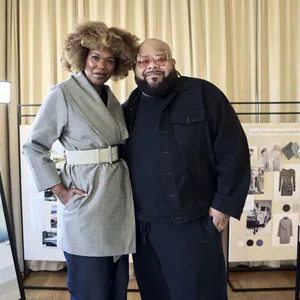On paper, I had every Black woman's dream. A six-figure salary. A flashy career in entertainment. But what most didn't realize is that I was severely burnt out. Corporate America had me working 70-hour work weeks, on average. I was juggling this while raising two small children. And as if that wasn't impossible enough, I was (and am!) an empath. I peep everything, intuitively pick up on vibes and easily absorb other people's energy and intentions.
Fast-paced environments that require lots of social interaction are extremely taxing for empaths and introverts, and that was my life for 10-12 hours each day! Every day, I constantly brushed off racist and sexist microaggressions, executed high-stakes presentations (despite being shy), schmoozed with celebrities and took on all of the last-minute, high-pressure projects needed to overcompensate for the deep insecurity that I felt inside about being a Black introvert.
Looking back, I was a train wreck waiting to happen. And happen it did.
At the height of my career, my once statement-making hair started to fall out in clumps. Then, the stomach issues, joint pain and random food allergies set in. Imagine being a young Black woman trying to convince your doctor that you're struggling with all of these random symptoms? Good luck!
Life has a funny way of forcing you to slow down when you refuse to slow down by choice; I was finally diagnosed with lupus and had to resign from my job. My doctor told me that my condition was likely triggered by my stressful lifestyle. Without realizing it, ignoring my true nature made me sick.
Although it was a hard pill to swallow at first, I recognize now that diamonds are forged through fire. Being diagnosed with lupus led to my spiritual awakening. If I hadn't gone through this crisis and discovered my passion for the metaphysical, my self-acceptance journey would have never begun. And for that, I am eternally grateful.
Despite society making Black women feel like we need to constantly display super-human strength and resilience, I am proud to be an empath. My experiences have taught me to respect my deep intuition and my need for a quieter, more introspective lifestyle. These are some of my favorite metaphysical practices as an empath that keep me healthy, emotionally, physically and spiritually.
1.Crystal Healing

Shutterstock
According to Harper's Bazaar, crystal healing is a type of alternative therapy that involves using gemstones to bring balance to your life and mind. Healing crystals have been referenced in the Bible, by ancient philosophers, and were frequently used as healing and protective talismans in ancient civilizations like Egypt, Greece and Japan.
Each crystal emits a unique energy pattern and frequency. Carrying these crystals influences your own personal frequency and the quality of your aura in very specific ways.
Rose Quartz crystals are purported to attract love. Citrine is rumored to attract wealth. My personal favorite is Black Tourmaline. I never leave my house without it. It is highly protective and resistant to negative energy. It shields you from taking on the energy of your surroundings and the people around you - an absolute must-have for empaths, introverts, and highly sensitive people.
2.Acupuncture
According to PopSugar.com, acupuncture is the "placing of acupuncture needles at certain acupuncture points to treat a variety of ailments and pain, which are rooted in the blockage of energy." I have used acupuncture consistently over the past five years and for me it has significantly reduced bloating and joint pain and has improved my digestion. It has also promoted deeper sleep, reduced stress, and tons of other benefits that I swear by. I always feel incredibly refreshed and sleep deeply following my acupuncture treatments and try to schedule these in at least 1-2 times a month.
3.Mindfulness
 Shutterstock
ShutterstockAccording to MayoClinic.org, mindfulness is "a type of meditation in which you focus on being intensely aware of what you're sensing and feeling in the moment, without interpretation or judgment." The key to practicing mindfulness successfully is through allowing ourselves to be "fully present, aware of where we are and what we're doing, and not overly reactive or overwhelmed" by what's going on around us.
I practice mindfulness by taking a phone-free walk for at least 30 minutes each day and turning on my senses so that I can fully take in and appreciate all that is going on around me. Limiting your time on social media, turning off your phone, and doing one thing at a time (like eating with the TV off) are other ways to incorporate mindfulness into your life.
4.Astrology
Astrology is "the study of the influence that distant cosmic objects, usually stars and planets, have on human lives." Astrology boasts lots of legendary followers including Psychologist Carl Jung, Hippocrates, and bank tycoon J.P. Morgan who famously said, "Millionaires don't follow Astrology. Billionaires do."
Whether you believe in astrology or not, science has shown that the phases of the moon and planets have a profound effect on humanity, especially those who are already highly sensitive by nature. I notice that I am particularly tense and wound up during the full and new moon phases when lunar energy is super charged. Knowing my astrological placements and transits have also been extremely helpful and incredibly accurate in determining my energy patterns and experiences in the days and weeks ahead.
5.Feng Shui

Shutterstock
According to Invaluable.com, feng shui, "often referred to as the art of placement" is, in the simplest of terms, "about positioning different elements to optimize 'Chi,' or energy in your environment." It is based on the belief that your environment has a direct effect on your mood and experiences.
I am so fascinated by feng shui and have noticed that when I follow its basic practices, like making sure my living space is clear and clutter-free so that energy can freely move, my mood, productivity and energy levels are instantly elevated. Notice how you feel immediately uplifted after cleaning your room? Having clutter and clothes around can be extremely draining to empaths and highly sensitive people.
6.Reiki
According to Reiki.org, "Reiki is a Japanese technique for stress reduction and relaxation that also promotes healing. It is administered by 'laying on hands' and is based on the idea that an unseen 'life force energy' flows through us and is what causes us to be alive."
When our "life force energy" is low, we are more likely to get sick or feel stress, and if it is high, we are more capable of feeling happy and healthy.
Reiki for me has been like therapy. The advice and energy that I receive from my Reiki practitioner is holistic and makes me keenly aware of the patterns and imbalances in my life. I try to schedule in a session at least once a month.
7.Taking Spiritual Moon Baths

Shutterstock
Rooted in ancient Ayurvedic practice, moon bathing is the act of tapping into the powerful energy of the moon to promote optimal physical and emotional health. There are a number of ways to tap into the energy of the moon - my favorite way is through my bi-weekly Moon Bath Regimen, i.e. taking a healing bath with crystals, essential oils, herb botanicals and a variety of sea salts.
When I take my baths, I use formulas that are specifically targeted to what's going on in my life at the time. I use Ylang ylang and Rose quartz if I need to boost feelings of acceptance and love for myself or to reconnect romantically with my partner. I use Green Aventurine and Eucalyptus essential oil if I'm feeling stagnant and unmotivated. Rhodonite is my go-to if I'm going through a tense situation like a break-up, or difficult work project. This practice has helped me so much that I created a company out of it.
Of all of my metaphysical and ritual self-care practices, moon baths are by far the most fulfilling and effective for me. I schedule them in twice monthly during the New Moon and Full Moon phases - with additional baths whenever I am feeling particularly heightened or over-stimulated. I view my ritual moon baths as much-needed alone time where I'm able to manifest positive vibes and experiences in my life.
Are you a member of our insiders squad? Join us in the xoTribe Members Community today!
Featured image by Shutterstock
- 'Sistas' Star Novi Brown On The Power Of Emotional Release ... ›
- Feeling Disconnected From God? - xoNecole: Women's Interest ... ›
- Best Meditation Practices For Your Zodiac Sign - xoNecole ... ›
- How To Ground Yourself Spiritually - xoNecole: Women's Interest ... ›
- Boris Kodjoe & Nicole Ari Parker Put Spiritual Practice First In Their ... ›
- How to Heal Based on Your Zodiac Sign - xoNecole: Women's Interest, Love, Wellness, Beauty ›
- Types Of Yoga: The Best Practice To Take - xoNecole: Lifestyle, Culture, Love, & Wellness ›
- What is Spirituality — Definition and Types of Spiritual Practices ›
- An Introduction to the Spiritual Disciplines | The Art of Manliness ›
- 10 Types Of Effective Spiritual Practices To Get Happiness ›
- Five Different Types of Spiritual Practices | Ashley Treatment Center ›
- 10 Types of Spirituality and Spiritual Practices - Happier Human ›













